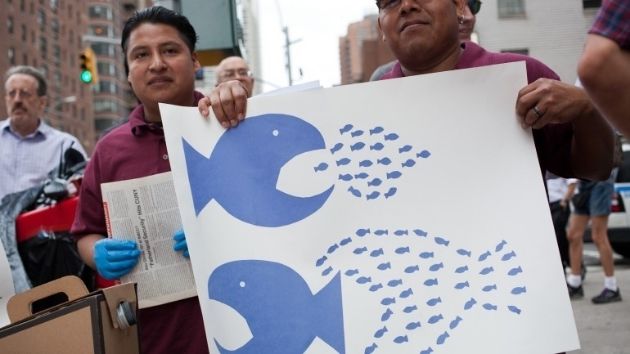
The Hand that Feeds is a David and Goliath story playing out in the streets of New York. Directors Rachel Lears and Robin Blotnick document the struggle of the immigrant food service workers as they fight for their rights and respect. In doing so, they paint the future of the American labor movement a little bit brighter.
It all starts at 63rd Street Hot & Crusty, a 24-hour deli franchise which has been serving many Upper East Side New Yorkers for more than a decade. Tired of getting underpaid and mistreated, some Mexican immigrant workers get involved themselves with Laundry Workers Center, a volunteer organization providing resources, legal services and training for the laundry and food industry workers, founded by tireless, passionate community activist Virgilio Arán. Some of the young activists from the Occupy Wall Street movement join their cause as well. Together they start picketing and handing out flyers outside the deli.
Some of their direct action bear fruit and the both sides sit down and talk. But unless the workers are in union, there is not going to be a collective bargaining. So they decide to form a small union of their own by voting. The bottom line is, the workers, whether documented or not, are protected under New York's wage theft prevention program and still can organize.
Directors build up the tension as the election day approaches. They even stage a funny mock voting scene, training the workers for not being intimidated by any official figures. The usual tactics of the management follow - false promises, bribing key members for management positions (divide and conquer) and hiring an anti-union firm.
At the center of The Hand That Feeds is a shy middle-aged father of two, Mahoma. The title of this film can also easily be The Education of Mahoma Lopez. Reserved and thoughtful, Mahoma is a good counterpart to more hot blooded, angry young workers. He turns anger into something positive. It's heart warming to see him emerging as a natural leader. Even a bigger turnaround comes from his wife because in the beginning, she is not completely comfortable with the idea of her husband being an activist for fear of them losing everything they built. But in the end, she becomes an ardent supporter.
Then there are young white activists. They are definitely not the violent troublemaker hippies the media love to make them out to be. They show up when direct action is called for, play the role of cannon fodders or 'arrestables' because they understand the undocumented workers can't risk being arrested and face deportation. Their dedication to the workers is one of the most moving part of the documentary.
It still amazes me to see people calling the picketers commie bastards. 'Communist' is still a dirty word after all these years. Do they even know that things everyone takes for granted - 40 hour work week, overtime pay, sick leave, vacations, safe working conditions and health benefits are all the result of years of union actions?
As the picketing continues, the funds for those now jobless workers run out. But as people start to lose hope, other union representatives show up at the picket line to stand with them. What we realize is that there is the collective power forging, and that the sense of solidarity among workers is alive and well.
The film highlights the brevity of these individuals who risk everything for better life for their families. They know that the battle is not won yet but still ongoing. Being a union member is a constant battle to keep what we've won so far, otherwise they will take it from us. That we can't let our guards down, ever. Mahoma learns that too.
The Hand that Feeds gives a cynical codger like me to hope again that the essence of the union is not completely lost in this country, that there is still solidarity among all workers. It's a feel good movie of the year.
The Hand that Feeds opens at Cinema Village on 4/3. For more information, please visit the film's website.
No comments:
Post a Comment